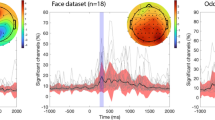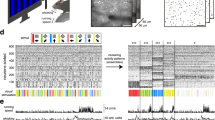Abstract
Lesions of the right parieto-occipital cortex in man produce a variety of behavioural disturbances which interfere with the detection of, and orientation to external stimuli1. One striking example is extinction to double simultaneous stimulation (DSS), in which presentation of a single stimulus in any area of the visual field results in its accurate description, but lateralised simultaneous presentation of two stimuli, one in each field, results in the verbal description of only the stimulus in the right visual field (RVF)2. While extinction to DSS can also be demonstrated in other (non-visual) sensory modalites3, and is occasionally seen following left-hemisphere lesions4 our concern here is with visual extinction to DSS following right parieto-occipital lesions whose precise nature is poorly understood although variety of theories have been proposed to account for it5–7. One of the critical, yet unexplored questions about extinction concerns the fate of the extinguished stimulus. The following observations demonstrate that although the extinguished stimulus often goes completely unnoticed by the patient, the patients are able to utilise the extinguished stimulus in an interfield comparison task. Accurate same/different judgments between the visual fields could be made in situations in which the patients did not know the identity of, and at times even denied the presence of, the left field stimulus.
This is a preview of subscription content, access via your institution
Access options
Subscribe to this journal
Receive 51 print issues and online access
$199.00 per year
only $3.90 per issue
Buy this article
- Purchase on Springer Link
- Instant access to full article PDF
Prices may be subject to local taxes which are calculated during checkout
Similar content being viewed by others
References
Friedland, R. P. & Weinstein, E. A. in Hemi-Inattention and Hemisphere Speicalization (eds Weinstein E. A. & Friedland, R. P.) 1–31 (Raven, New York, 1977).
Bender, M. B. in Hemi-Inattention and Hemisphere Specialization (eds Weinstein, E. A. & Friedland, R. P.) 107–110 (Raven, New York, 1977).
Critchley, M. Brain 72, 538–561 (1949).
Denny-Brown, D. & Banker, B. Archs neurol. Psychiat. 71, 302–313 (1954).
Eidelberg, E. & Schwartz, A. S. Brain 94, 91–108 (1971).
Heilman, K. M. & Valenstein, E. Neurology 22, 660–664 (1972).
Battersby, W. S., Bender, M. B. & Pollack, M. Brain 79, 68–93 (1956).
New, P. F. J. & Scott, W. R. Computerized Tomography of the Brain (Williams and Wilkins, Baltimore, 1975).
Gazzaniga, M. S. The Bisected Brain (Appleton-Century-Croft, New York, 1970).
Treisman, A. M. J. verb. Learning verb. Behav. 3, 449–459 (1964).
Lewis, J. L. J. exp. Psych. 85, 225–228 (1970).
MacKay, D. G. Q. J. exp. Psych. 25, 22–28 (1973).
Lackner, J. R. & Garrett, M. F. Cognition 1, 359–374 (1973).
Author information
Authors and Affiliations
Rights and permissions
About this article
Cite this article
Volpe, B., Ledoux, J. & Gazzaniga, M. Information processing of visual stimuli in an ‘extinguished’ field. Nature 282, 722–724 (1979). https://doi.org/10.1038/282722a0
Received:
Accepted:
Issue Date:
DOI: https://doi.org/10.1038/282722a0
This article is cited by
-
Hemispheric biases and the control of visuospatial attention: an ERP study
BMC Neuroscience (2005)
-
The use of visual feedback is independent of visual awareness: evidence from visual extinction
Experimental Brain Research (2005)
Comments
By submitting a comment you agree to abide by our Terms and Community Guidelines. If you find something abusive or that does not comply with our terms or guidelines please flag it as inappropriate.



